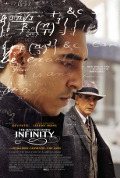
Directed by
Matt Brown
108 minutes
Rated PG
Reviewed by
Bernard Hemingway

The Man Who Knew Infinity
Synopsis: The story of the relationship between Srinivasa Ramanujan (Dev Patel) , a young self-taught Indian mathematician, and Cambridge professor G. H. Hardy (Jeremy Irons), in the early years of the 20th century.
When I was a child at a Catholic primary school we were given “Lives Of The Saints” for our edification – slim narratives which told how some humble soul was chosen by God to perform miraculous works in His Name before being done to death by heathens and naysayers. The Man Who Knew Infinity plays very much like this: a prophet endowed with the gift of mathematical genius is unable to find a job in his own country but is plucked from penurious obscurity and transported to the Jerusalem of pure mathematics of the time, Cambridge, where he performs wondrous deeds before succumbing to institutional jealousy, an inadequate diet, and England’s sunless clime.
Although based, as they say, on “true events”, Matt Brown’s film, which he adapted from a book by Robert Kanigel, might as well have been called “The Canonisation of Someone You’ve Never Heard Of Before”. There is clearly no question that Ramanujan was an extraordinary mathematician. The trouble, or at least one of the troubles, is the way his story is homogenized into a piously simplistic and stereotypical form with its roots in Christian hagiography, a form that, ironically, given the collective IQ level of its characters, barely stops short of insulting its audience’s intelligence with its glibness, the seductively pictorialized setting of the hallowed halls of Cambridge notwithstanding.
Thus, although Ramanujan is initially depicted as a brilliant young man shunned by the educational establishment in his home state of Madras, he had in fact long been recognized at both primary and secondary school levels for his exceptional proficiency in mathematics. His inability to find a teaching post had more to do with his poverty and the realities of Indian bureaucracy than any question as to his ability. Equally, whilst the film presents him as “inspired”, he was an autodidact who had devoured every book on pure mathematics available to him, books which were unsurprisingly, given India’s status as a imperial adjunct at the time, all of English origin. The very fact that he writes to G. H. Hardy (amongst many others apparently) is in itself testament to a practical awareness glossed over by the ingenuous narrative.
Another significant sleight of hand is the depiction of Ramanujan’s wife. If one is wont to wonder why she is so subservient to Ramanujan’s possessive mother, let alone (in an important narrativr strategy) unable to post her own letters to her husband in England, well the explanation is that, despite being played here by a grown (and, of course, pretty) actress (Devika Bhise), she was married to Ramanujan at the age of 10 and so, by the time we encounter her she was in reality barely in her teenage years.
This, shall we say, spirit of romanticisation continues when we switch to the Cambridge section of the film, with its umbrageous timber-panelled rooms and monkish dons beavering away at the altars of their rarefied vocations and where apparently the tree that held the apple that fell on Sir Isaac Newton’s head stands. Here Irons, needless to say, charms as the tweedily awkward. ivory-tower dwelling Hardy but in the only other significant role Toby Jones looks uncomfortable throughout. Understandable, as he has little to do but hover in the background looking bemused and/or bewildered like a British Wallace Shawn. Dev Patel, who audiences will recognize from Slumdog Millionaire, gives a contained performance which if unremarkable at least has the benefit of not adding to the tendentiousness of Brown's script and direction.
Clearly the film is buying into similar territory as last year’s highly successful films, The Theory of Everything and The Imitation Game but despite its winning allegiance to the “Mr Chips” tradition of English film, the makers seem not to have considered that pure mathematics, albeit of the cutting edge variety, hardly stacks up against explaining the origins of the universe while combating motor neurone disease or defeating the Hun. There is, in other words, nothing at stake here that more than a handful of people are ever likely to understand or care about. And that is a significant issue.
There is one theme that holds considerable cross-demographic potential and that is the conflict between the Western rationalist and Eastern mystic traditions. On the one hand we have the atheistic Hardy’s compulsive need for logical proof and on the other the devout Hindu Ramanujan’s claim to be visited by the voice of God. To conjoin these in the field of pure mathematics as has long been done with quantum theory could have yielded a fascinating film Unfortunately, and belying its title, we really only get a bunch of squiggles on a blackboard as Hardy (with the occasional cautionary aside from Jeremy Northam’s Bertrand Russell) inexorably drills Ramanujan into the Western model oblivious to the fact that his humble protégé is dying of TB. Throughout the film in fact the perspective is firmly Anglocentric with Ramanujan a largely passive device in a formulaic narrative.
Srinivasa Ramanujan was evidently a genius and, particularly as it might be the only time that his intriguing story is told, it’s a pity that this film has done it with so little inspiration. It is worth catching for the inherent interest of its content but be prepared to do some of your own follow-up reading afterwards.

Want more about this film?


Want something different?




